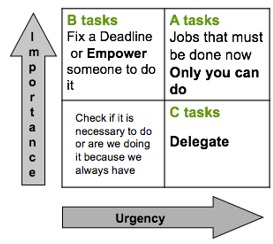We have reached the most important aspect of Leadership and that is what to and what not to, pass on to my team. I am sure you have heard the phrase that “this is above my pay grade”, and there is truth in that statement, even if at times it is being used in jest. We must ensure that the right task is given to the right person for genuine reasons.

A leader must discern what they should delegate, empower, or do themselves. I find the decision grid below is very effective in the decision making process. It is based on a version of the four quadrants which was first introduced by President Eisenhower.

The grid reminds you to first look at how “important” a task is, and then its level of “Urgency”. Clearly if something is “urgent” and “important” you will have to do it yourself, in case it was not done properly and there wouldn’t be the time to undo and then redo.
If it is “important” but not “urgent”, you can empower a member of your team who has reached that level of development, as there is time to check up on how they are doing, and coach appropriately.
That leaves the bottom half of the grid. Essentially anything that was not important could be delegated whether it is urgent or not. You should distance yourself from tasks which are less urgent as well as less important. However, we must be ruthless in our decision as to whether something actually needs to be done. Sometimes we are doing it just because we always have done so. Why is the piano on the left side of the church, well, because it has always been there!
The difference between delegation and empowerment is the need to be able to hand over decision making ability to the person you are assigning the task or project to and, as a result, there are some things that can’t be given to all members of your team. To decide this, we need to review some of the areas we have looked at and measure them against the person you are looking to delegate or empower.
There are five characteristics of a team member that we need to evaluate:
-
Development Level
We looked at their level of ability:
Unconscious incompetence Neither, still growing needs support
Conscious incompetence Neither, getting there, more growing needed
Conscious competence Delegate
Unconscious competence Empower
-
Skill level
We looked at their skill level versus training needs:
No skill for the task Neither – needs more training before they can be delegated to or empowered
No Skill but can be trained to do it Delegate
Skilled Delegate/Empower
-
Trust
We discussed the serious aspect of trust and how vital it is:
No trust Neither, need to work on trust level
Weak trust levels Delegate with supervision
Good trust Delegate
Totally trustworthy Empower
-
Accountability
We looked at those who show accountability and those who try to avoid it:
No accountability Delegate with supervision
Accountable Delegate/Empower with supervision
Fully accountable Empower
-
The correct behavioural trait
When judging them on this area we will have to judge based on the task or project. If you need an outgoing person who can speak to a crowd then you must find the person with the behaviour to suit like a high extrovert. Conversely if you have a task or project that requires a lot of detail then you need a person high in conformity.
Once we have evaluated our team member against the 5 criteria’s, and we have used the grid to determine whether we delegate or empower, we can then successfully give the right person the correct task or project to do.
Follow Up is Crucial
If the task or project is spread over several weeks, then you will need to review how they are doing and not just wait to the end to see the outcome. If this is the case then you must tell them about the follow up meetings at the outset, so that they know it will happen, which will motivate them to get on with it, but also so that when you do check up on them, they do not think you do not trust them.
Remember that you can delegate a task, but you cannot abrogate your responsibility for the task. Follow up is key.
To read this series from the beginning click here
